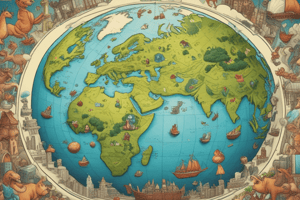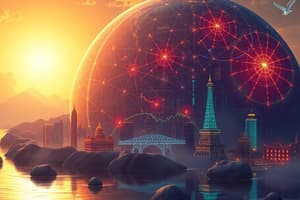Podcast
Questions and Answers
What is economic growth?
What is economic growth?
The increase in gross domestic product (GDP) caused by an increase in the production of goods and services over a period of time.
What is colonialism?
What is colonialism?
The actions of a group or country seeking its own benefit through the subjugation of another group or country. These actions often include imposing cultural, economic, or religious practices on the subjugated group or country.
What is a mercantile system?
What is a mercantile system?
An economic model where a country increases its wealth by maintaining a positive balance of trade with other nations, maximizing exports while minimizing imports.
What are trans-national corporations?
What are trans-national corporations?
What are concession companies?
What are concession companies?
What is a command economy?
What is a command economy?
What is economic liberalism?
What is economic liberalism?
What is Keynesian economics?
What is Keynesian economics?
What is progressive thought?
What is progressive thought?
What is neo-liberalism?
What is neo-liberalism?
What is economic globalization?
What is economic globalization?
What are tariffs?
What are tariffs?
What are non-tariff barriers?
What are non-tariff barriers?
What is populism?
What is populism?
What is the Living Planet Index?
What is the Living Planet Index?
What is an Ecological Footprint (EF)?
What is an Ecological Footprint (EF)?
What is the Index of Sustainable Economic Welfare (ISEW)?
What is the Index of Sustainable Economic Welfare (ISEW)?
What is the Genuine Progress Indicator (GPI)?
What is the Genuine Progress Indicator (GPI)?
What is a Traditional Society (in terms of economic development)?
What is a Traditional Society (in terms of economic development)?
What does 'Establishing conditions for take off' refer to?
What does 'Establishing conditions for take off' refer to?
What is 'Economic Takeoff'?
What is 'Economic Takeoff'?
What does 'Drive to maturity' refer to?
What does 'Drive to maturity' refer to?
What is 'High mass consumption'?
What is 'High mass consumption'?
What is Modern Economic Colonialism?
What is Modern Economic Colonialism?
What is the Legacy of Colonialism?
What is the Legacy of Colonialism?
What is a traditional economy?
What is a traditional economy?
What is a market economy?
What is a market economy?
What does balancing economic growth with environmental sustainability require?
What does balancing economic growth with environmental sustainability require?
What do environmental impacts in economic analysis involve?
What do environmental impacts in economic analysis involve?
Economic Growth
Economic Growth
Colonialism
Colonialism
Mercantile System
Mercantile System
Trans-National Corporations
Trans-National Corporations
Concession Companies
Concession Companies
Command Economy
Command Economy
Economic Liberalism
Economic Liberalism
Keynesian Economics
Keynesian Economics
Progressive Thought
Progressive Thought
Neo-Liberalism
Neo-Liberalism
Economic Globalization
Economic Globalization
Tariffs
Tariffs
Non-Tariff Barriers
Non-Tariff Barriers
Populism
Populism
Living Planet Index
Living Planet Index
Ecological Footprint (EF)
Ecological Footprint (EF)
Index of Sustainable Economic Welfare (ISEW)
Index of Sustainable Economic Welfare (ISEW)
Genuine Progress Indicator (GPI)
Genuine Progress Indicator (GPI)
Traditional Society
Traditional Society
Establishing conditions for take off
Establishing conditions for take off
Economic Takeoff
Economic Takeoff
Drive to maturity
Drive to maturity
High mass consumption
High mass consumption
Modern Economic Colonialism
Modern Economic Colonialism
Legacy of Colonialism
Legacy of Colonialism
Traditional economy
Traditional economy
Market economy
Market economy
Balancing economic growth with environmental sustainability
Balancing economic growth with environmental sustainability
Environmental impacts in economic analysis
Environmental impacts in economic analysis
What is a Traditional Society?
What is a Traditional Society?
What does 'Establishing conditions for take off' mean?
What does 'Establishing conditions for take off' mean?
What does 'Drive to maturity' mean?
What does 'Drive to maturity' mean?
Flashcards
Economic Growth
Economic Growth
Increase in gross domestic product (GDP) due to increased production of goods and services.
Colonialism
Colonialism
Seeking benefit through subjugation of another group/country via cultural, economic, or religious imposition.
Mercantile System
Mercantile System
Country increases wealth by maintaining a positive balance of trade, maximizing exports and minimizing imports.
Neo-Colonialism
Neo-Colonialism
Signup and view all the flashcards
Trans-National Corporations
Trans-National Corporations
Signup and view all the flashcards
Concession Companies
Concession Companies
Signup and view all the flashcards
Command Economy
Command Economy
Signup and view all the flashcards
Mixed Economy
Mixed Economy
Signup and view all the flashcards
Economic Liberalism
Economic Liberalism
Signup and view all the flashcards
Keynesian Economics
Keynesian Economics
Signup and view all the flashcards
Progressive Thought
Progressive Thought
Signup and view all the flashcards
Neo-Liberalism
Neo-Liberalism
Signup and view all the flashcards
Economic Globalization
Economic Globalization
Signup and view all the flashcards
Tariffs
Tariffs
Signup and view all the flashcards
Non-Tariff Barriers
Non-Tariff Barriers
Signup and view all the flashcards
Populism
Populism
Signup and view all the flashcards
Living Planet Index
Living Planet Index
Signup and view all the flashcards
Ecological Footprint (EF)
Ecological Footprint (EF)
Signup and view all the flashcards
Index of Sustainable Economic Welfare (ISEW)
Index of Sustainable Economic Welfare (ISEW)
Signup and view all the flashcards
Genuine Progress Indicator (GPI)
Genuine Progress Indicator (GPI)
Signup and view all the flashcards
Traditional Society
Traditional Society
Signup and view all the flashcards
Establishing conditions for take off
Establishing conditions for take off
Signup and view all the flashcards
Economic Takeoff
Economic Takeoff
Signup and view all the flashcards
Drive to maturity
Drive to maturity
Signup and view all the flashcards
High mass consumption
High mass consumption
Signup and view all the flashcards
Colonialism
Colonialism
Signup and view all the flashcards
Modern Economic Colonialism
Modern Economic Colonialism
Signup and view all the flashcards
Legacy of Colonialism
Legacy of Colonialism
Signup and view all the flashcards
Traditional economy
Traditional economy
Signup and view all the flashcards
Market economy
Market economy
Signup and view all the flashcards
Command economy
Command economy
Signup and view all the flashcards
Balancing economic growth with environmental sustainability
Balancing economic growth with environmental sustainability
Signup and view all the flashcards
Environmental impacts in economic analysis
Environmental impacts in economic analysis
Signup and view all the flashcards
Study Notes
- These flashcards define key economic concepts and issues.
Economic Concepts
- Economic Growth: GDP increase over time via increased production.
- Colonialism: A country seeks its own benefit by subjugating another, including imposing cultural, economic, or religious practices.
- Mercantile System: A country increases wealth by maintaining a positive trade balance, maximizing exports and minimizing imports.
- Neo-Colonialism: Control of another country through economic, trade, and cultural influence.
- Trans-National Corporations: Companies operating globally without being tied to a single country.
- Concession Companies: Companies created by colonizing countries to trade in specific regions or products, often governing the trade area.
- Command Economy: The government determines prices and quantities of goods and services.
- Mixed Economy: Combines free enterprise and government intervention.
- Economic Liberalism: The belief that economies should operate without government intervention, proposed by Adam Smith in 1776.
- Keynesian Economics: Government should increase spending during economic slowdowns to stimulate the economy.
- Progressive Thought: Belief that unregulated capitalism is harmful and the government should regulate the economy to promote social justice.
- Neo-Liberalism: A modern term describing Adam Smith's ideas, such as a free market economy and a reduced role for government.
- Economic Globalization: A worldwide economic system with easy movement of capital, goods, labor, production, and resources as trade barriers are removed.
- Tariffs: Taxes on imports or exports.
- Non-Tariff Barriers: Regulations protecting domestic businesses from international competition, like quotas or bans, aside from tariffs.
- Populism: A political movement linked to citizens' aspirations, viewed as a struggle between "the people" and "others."
- Traditional Economy: An economic system based on agriculture, fishing, hunting, and gathering
- Market Economy: An economic system where prices are determined by supply and demand
- Command Economy: An economic system where the supply of goods and services is determined by the government
Sustainability and Welfare Indicators
- Living Planet Index: Measures global biodiversity in terrestrial, freshwater, and marine ecosystems, created by the World Wildlife Fund.
- Ecological Footprint (EF): Measures the environmental impact of a lifestyle, expressed as the land needed to sustain it.
- Index of Sustainable Economic Welfare (ISEW): Measures beneficial vs. unsustainable activities, like adding child-care costs and subtracting pollution costs.
- Genuine Progress Indicator (GPI): Measures a country's well-being using economic, environmental, and social indicators.
Stages of Economic Development
- Traditional Society: Stage 1, based on subsistence agriculture, often with dictatorships or monarchies.
- Establishing conditions for take off: Stage 2, where society gains wealth and becomes more centralized.
- Economic Takeoff: Stage 3, new technology is introduced, and the tertiary sector expands in cities.
- Drive to maturity: Stage 4, economic growth outpaces population growth, with technological improvements in primary and secondary sectors.
- High mass consumption: Stage 5, people have enough money and demand more goods and services.
Colonialism definitions
- A practice where one country rules another and develops trade for its own benefit, restricting colonies to trade only with the mother country.
- A modern form of colonialism that exerts economic power over another country without taking over land
- Cultural heritage, such as languages, persisting because of colonial powers creating new boundaries
Balancing Economic Growth and Environmental Sustainability
- Requires including environmental concerns into financial decisions and implementing policies promoting sustainability and innovation.
- Involves measuring environmental impacts and promoting sustainable development to provide long-term benefits without harming the environment.
Studying That Suits You
Use AI to generate personalized quizzes and flashcards to suit your learning preferences.




